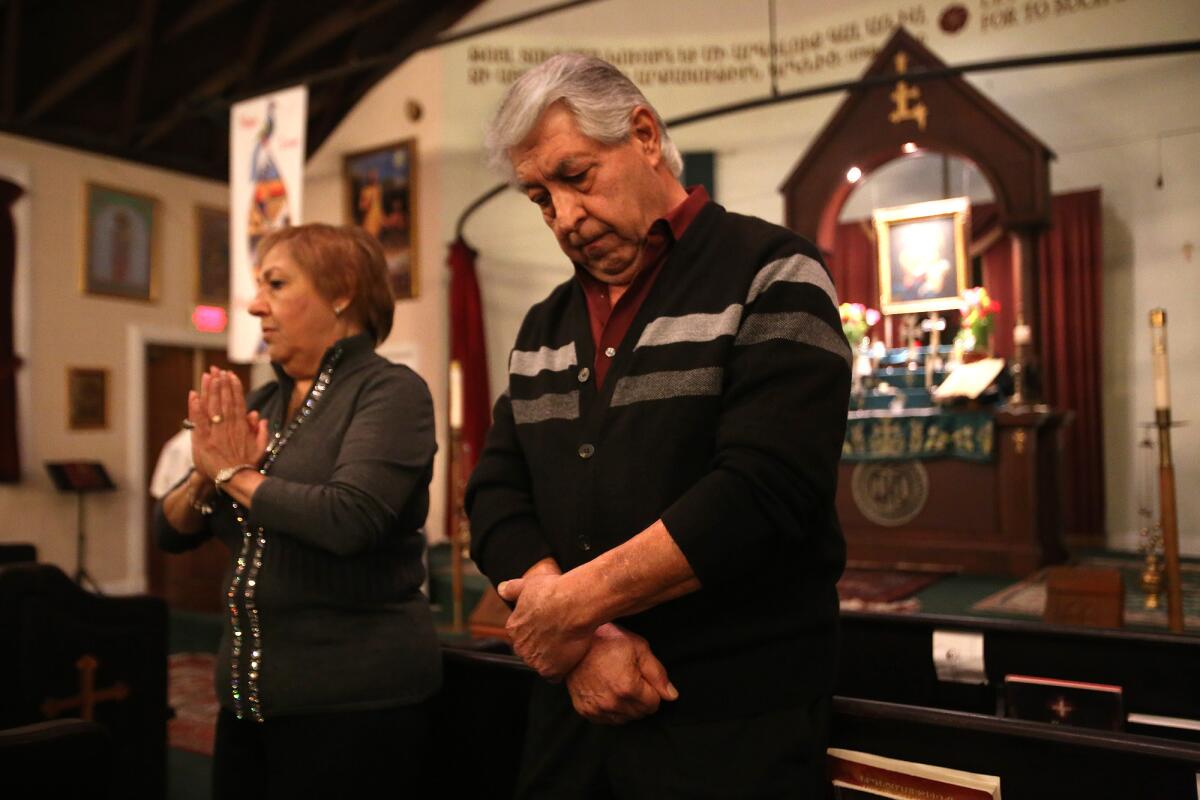Bizarre death on freeway sign puts spotlight on religious animal ‘sacrifice’

Sako Hakopian, 69, right, and his wife, Ripsik, 65, talk about how they perform “matagh,” or offerings, as part of their faith at the Armenian Church in Glendale on Wednesday.
- Share via
Sako and Ripsik Hakopian stood in the pews of their Glendale church and waited for Wednesday night’s Bible study to begin. Ten years ago, they would not have considered themselves avid churchgoers.
But after their daughter, Yvette, was killed in 2008, Ripsik Hakopian felt an immediate draw to the humble Armenian church across the street from her home.
Forty days of mourning passed before Hakopian finally mustered the strength to step inside St. Peter Armenian Church. One year later the Hakopians made their first matagh, or offering, through the church.
“I knelt on the altar, and I knew I had to do something,” Hakopian, 65, said as she fought tears.
The practice came to the fore last week, after reports that a family had performed a lamb sacrifice days before their 20-year-old son, Richard Pananian, was killed in a traffic accident that sent his body flying onto a freeway sign. The already bizarre nature of the accident, which spread widely on social media, was magnified by the idea of an animal sacrifice. But though the Pananian family’s offering was an echo of an ancient ritual, it was not what many people imagined.
In the case of the Hakopians, they paid for food to be donated to people on skid row and helped distribute it to homeless men and women.
That was their sacrifice.
Matagh is a tradition within the Armenian Church used to show appreciation to God for saving someone from misfortune or granting good health, or for peace for deceased loved ones, according to church teachings.
The Mother See of Holy Etchmiadzin in Armenia, which serves as the headquarters for the Armenian Apostolic Church, says the main purpose of the offering is “giving a gift to God and giving alms to the poor.”
On Oct. 30, Pananian was headed to his new job at Glendale Collision Center, driving south on the 5 Freeway just north of the 134 Freeway. Traveling at a high speed, his Ford Fiesta rear-ended a pickup and overturned, the California Highway Patrol said. Pananian was not wearing a seat belt, and he was ejected, landing on the Colorado Street freeway sign, dead.
Pananian’s cousin, Armen Kardashian, said the family are devout Christians and had performed matagh days before because Pananian had just recovered from a serious health issue. Kardashian wasn’t with his cousin’s family for the matagh but said family members had purchased a lamb that had already been slaughtered by a rancher, cooked it into a stew with salt blessed by a priest and distributed the stew to several families, including his.
Kardashian described Pananian as a kind, generous man who loved cars, video games and being out in nature. He’d often help out in his father’s shoe repair store or Kardashian’s iPhone repair store and never accepted money, he said.
He also had a silly side and loved to tell jokes, Kardashian said, recalling how he used to call him “chief.”
“He was always a jolly kid,” Kardashian said. “He had this smile. When you looked at him, you couldn’t help but smile.”
Although the church in Armenia describes matagh as an ancient practice that requires the sacrifice of a male animal with salt to purify the offering, experts say modern interpretations do not call for slaughtering an animal. Instead, they say, the emphasis is on “paying it forward” to those in need.
“It’s not necessary to do that, the slaughter, as it says in the Old Testament,” said Mashdots Jobanian, director of Christian education at the Western Diocese of the Armenian Church.
Jobanian described matagh as the purest form of giving thanks.
The Rev. Vazken Movsesian of St. Peter church said matagh is “not a magical incantation, and the Armenian Church does not condone that kind of thing.... We don’t sell protection.”
Movsesian said his church practices matagh once a month, and the meat they serve comes from Vons or Costco. Sometimes, he said, the matagh is a vegan meal. Families, such as the Hakopians, pay for meals and join other congregants to feed homeless families at a local shelter.
“Instead of bringing an animal, we ask the homeless shelter how much it would cost to feed the people,” Movsesian said.
For the Hakopians, matagh serves as a means to give back to the community after finding solace within the church, they said.
The last time Sako Hakopian saw an animal sacrifice as an offering was decades ago when he still lived in Iran. Ripsik said her family never made such an offering.
“In this church, we do a matagh that is more meaningful than just sacrificing an animal,” Sako Hakopian said in Persian. “A sacrifice or offering is not about what animal you kill. It is about helping others.”
For his part, Movsesian said he hasn’t seen that interpretation of the practice since he was a seminarian in Armenia in the 1970s.
But even if there were an animal sacrifice, “the actual practice is not meant as a magical protection service” like some people are interpreting it.
“It comes across that we are taking back the world to some medieval time,” he said. “And it’s not about that.”
Twitter: @sarahparvini and @taygoldenstein
ALSO:
Suspect in UC Merced attacks described as ‘antisocial,’ was an engineering student
San Bernardino police officer dies in car crash with alleged drunk driver
14-year-old boy arrested in teen sister’s stabbing death in ClaremontMore to Read
Sign up for Essential California
The most important California stories and recommendations in your inbox every morning.
You may occasionally receive promotional content from the Los Angeles Times.












